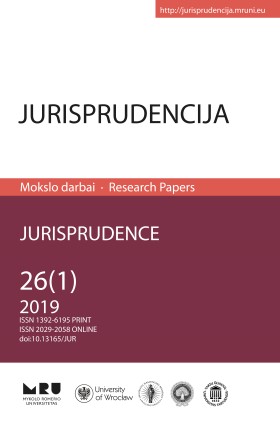DOKUMENTŲ ĮTEIKIMAS TARPVALSTYBINĖSE CIVILINĖSE BYLOSE
SERVICE OF DOCUMENTS IN CROSS-BORDER CIVIL CASES
Author(s): Remigijus JokubauskasSubject(s): Law, Constitution, Jurisprudence, Public Administration
Published by: Mykolas Romeris University
Keywords: service of documents in cross-border civil cases; the right to a fair trial;
Summary/Abstract: The article analyses service of documents in cross-border civil cases. Proper service of documents is particularly important to ensure the right to a fair trial. The right to a fair trial might be violated if the addressee is not properly informed about the case and cannot enjoy this right effectively.The European Court of Human Rights has established a due diligence requirement regarding the service of documents and information about civil proceedings (Gyuleva, Zavodnik, Schmidt cases). Though this requirement is not defined in the case law, the author has found that it requires courts to ensure that persons in the case are properly informed and have enough time to prepare for legal defense. Courts shall ascertain whether the addressee actually received documents and can enjoy the right to a fair trial effectively. Therefore, courts shall establish the actual address of the addressee and consider which means of service of documents are the most appropriate in each case.The article analyzed practical issues regarding the service of documents under the Regulation No. 1393/2007. First, can documents may be delivered to the third person, but no the addressee in person? Second, how knowledge of the language of the addressee is established? Third, should all annexes to the document be translated? Fourth, does the failure to deliver a standard form II of the Regulation 1393/2007 to the addressee makes the service of documents procedure invalid? Fifth, how the date of the delivery of documents shall be established when documents have been served by several means?Knowledge of language raises various practical problems. Obviously, in order to understand legal documents, a certain level of knowledge of the language shall be established. The author of the article has found that in deciding the level of knowledge of the addressee‘s language, the court shall assess the actual knowledge of the language, taking into account all relevant facts: the language previously used, the language spoken by the parties prior to the case, the language of the transactions, the profession of the addressee, documents certifying the knowledge of the language, a citizenship. The use of the specific language in business relations alone does allow to presume knowledge of the language but is a significant factor in this assessment.The need to translate the annexes to the document depends on the content of the document and the probative value of the annexes, the defendant‘s ability to understand the subject matter and the basis of the dispute.
Journal: Jurisprudencija
- Issue Year: 26/2019
- Issue No: 1
- Page Range: 157-177
- Page Count: 21
- Language: Lithuanian

